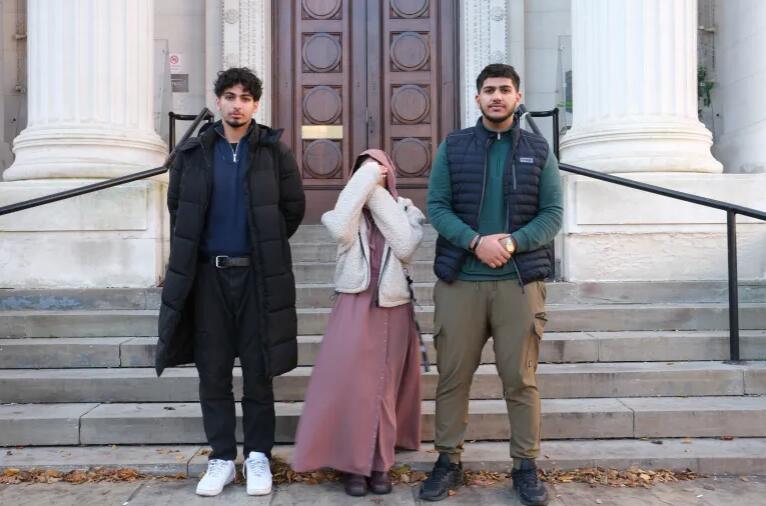At exactly 11am on a Saturday in mid-November, hundreds of students from Luton Sixth Form College streamed out of their school, gathering outside in a sea of black, white and red keffiyehs and Palestinian flags.
They carried banners and placards saying “Bombing kids is not self-defence” and “This is no ‘conflict’ it’s genocide”, referring to Israel’s war on Gaza after Hamas’s October 7 attacks on southern Israel. Student organisers of the rally read out speeches against the war, in which Israeli bombs and artillery fire have now killed more than 21,000 Palestinians in Gaza, including more than 8,000 children.
Yet Israel wasn’t the only target of criticism at the rally: The students were protesting against their college’s links to an arms company that had supplied weapons and advanced military platforms to Israel.
The walkout was organised by the school’s student council after its chair, 18-year-old Hassan Sajjad, was approached by students critical of the senior leadership at the college, who some students felt had failed to address or acknowledge strong student sentiment towards the Israel-Gaza conflict.
But a week later, Sajjad and the other council members were informed by the school leadership that their entire council had been disbanded, months before their term was supposed to end in April 2024. Their student council email communication was also suspended.
“It shattered my understanding of democracy in college, and the idea of freedom of speech and ‘British values’,” Sajjad said.
Since the start of the war, the United Kingdom has seen unrelenting demonstrations urging the government to call for a ceasefire. Yet as students in schools, colleges and universities across the UK also joined the chorus condemning the war, they have also been reprimanded, subtly or explicitly, for their pro-Palestine advocacy in several instances, igniting concerns around freedom of speech.
Luton, a town less than 48km (30 miles) north of London with a majority ethnic minority population, has been at the centre of that debate after the backlash faced by students over their walkout.
It all started when students discovered that their school had played host to a weapons giant with ties to Israel’s military.
![Students at the protest at Luton Sixth Form College [Courtesy Miheer Shet]](https://www.aljazeera.com/wp-content/uploads/2023/12/image0-1704031857.jpeg?w=770&resize=770%2C578&quality=80)
‘Protest to have your voice heard’
Though Israel is today a major arms exporter, it continues to import weapons from the West. The United States is its biggest military partner and the source of 83 percent of Israel’s weapons imports between 1950 and 2020.
But the UK has also been a steady military ally to Israel. It has licensed arms worth more than 442 million pounds ($563m) to Israel between May 2015 and August 2022 and is now facing a legal challenge in the High Court from Palestinian human rights groups.
Demonstrations have been held outside other arms factories like those of defence giant BAE Systems and Leonardo — formerly known as Finmeccanica — which produce parts for Israeli fighter jets. In late October, dozens of trade unionists protested outside the Kent site of Instro Precision Ltd, a British subsidiary of Israeli weapons manufacturer Elbit Systems.
Yet there are more subtle ways in which Israel’s war machine intersects with British educational institutions.
Leonardo, one of the world’s largest arms companies, manufactures naval guns installed on Israeli warships used against Gaza in the current war. In a “multi-billion dollar” deal, Leonardo supplied seven training helicopters to Israel, according to The Times of Israel. It also provided the Israeli Ministry of Defense with “advanced mobile radars” in June. Thirty percent of the company is owned by the Italian Ministry of Economy and Finance according to Campaign Against Arms Trade, with substantial production in both the US and the UK.
Leonardo has also participated in career fairs at British schools and colleges — including Luton Sixth Form College, students discovered, as scrutiny on Israel’s weapons suppliers grew with the spiralling death count of Palestinian civilians in Gaza. Since the start of the October 7 war, Leonardo’s market valuation has grown by 20 percent.
A walkout wasn’t the student council’s first planned course of action against the war. The council – who represent over 3,000 students – suggested organising a fundraiser for Gaza and the occupied West Bank.
As the civilian death count mounted in Gaza, the council also flagged the college’s relationship with Leonardo. For about a month, their requests were met with silence. Then, the school’s leadership said the students could fundraise but only for an event that wasn’t specifically for Palestinians.
“If students aren’t being catered for and the [school leaders] are not respecting the student council – the people who represent the thousands – then you only have one option left: that’s to protest to have your voice heard”, Sajjad said.
On November 18, hundreds of students walked out of their lesson in what was a peaceful protest. “We wanted students to know this is your legal right to protest, and you shouldn’t feel pressured or afraid to protest”, said Arsalan Ilyas, 17, a student at the college.
‘Inherently Islamophobic’
The crackdown on the now-suspended council was swift, but its members soon discovered more. They found out, from social media platform X, that Shout Out UK, an organisation that aims to equip people with “critical thinking skills and emotional resilience needed to question divisive or extreme content” according to its CEO, Matteo Bergamini, was delivering workshops at the college in December.
The news sparked further outrage among students, as Shout Out UK has worked on a number of Home Office Prevent programmes across the country, with a focus on countering extremist misogyny, online disinformation and the far right.
Prevent, the UK government’s controversial counter-terrorism programme which aims to “stop people from becoming terrorists or supporting terrorism”, has been accused by critics of conflating extremism – and on occasion, pro-Palestine advocacy – disproportionately with Muslim students.
According to Waqas Tufail, a reader in Criminology at Leeds Beckett University, pro-Palestinian activism has long been regarded “formally and informally” as an indicator of potential extremism through Prevent.
“Spaces of education have been a particular target for this form of racial profiling and criminalisation, escalating after the so-called Trojan Horse affair – an event that can only be described as a state-led Islamophobic witch-hunt,” Tufail said. He was referring to a widely debunked conspiracy theory that there was a so-called Islamist plot to take over schools in 2014 that nevertheless led to the disqualification of several teachers and a focus under then secretary of state for education, Michael Gove, on requiring teachers and childcare providers to prevent the grooming and radicalisation of young people.
In November, Amnesty International called for the abolition of Prevent, accusing it of severe human rights abuses and of encouraging a culture of “thought policing”.
In a statement released December 8 responding to a story published by The Guardian, Bergamini said the workshops had been confirmed by Luton Council in April 2023 months before the October 7 attacks, and that the recent walkout conducted by the students had no influence on the timing of the workshop delivery.
But a key organiser of the college’s walkout, Aisha Naushahi Hasan, a 16-year-old student, told Al Jazeera English that such workshops were “inherently Islamophobic” because of the suggestion that Luton Sixth Form’s students were potential “extremists” and “radicals”.
“While this is not a Jewish and Muslim issue, a majority of the college [students] are Muslim. An overwhelming majority of people who attended the protest are Muslim,” she said,
Luton Sixth Form College, Shout Out UK, and Leonardo did not respond to Al Jazeera English’s request for comment.
But the school has commented on its links to Leonardo, following the protest walkout. According to the college, Leonardo attended job fairs at the school offering work experience opportunities to STEM students. They also contributed to career fairs for schools and colleges in the local area, offering work placements to students.
In an online statement sent to students and staff and published on X on November 29, Luton Sixth Form College denied that it was “closely affiliated” with the arms company, and that “all further activities with Leonardo will be suspended until further notice”.
“We are currently reviewing our position with them in conjunction with Luton Borough Council and other schools and colleges,” the statement said.
![Students at the protest at Luton Sixth Form College on November 18, 2023 [Courtesy of Miheer Shet]](https://www.aljazeera.com/wp-content/uploads/2023/12/image1-1704031976.jpeg?w=770&resize=770%2C578&quality=80)
‘Being British’
Ahead of a national pro-Palestine in London coinciding with Armistice Day on November 1, Suella Braverman, the then British home secretary, was criticised after describing pro-Palestine protesters as “hate marchers”.
A month before, Braverman wrote in a letter to the chief constables in England and Wales that waving a Palestinian flag or singing a chant advocating freedom for Arabs in the region may be a criminal offence.
The top-down criticism of support for Palestinians has been met with a chilling effect of pro-Palestinian advocacy across the UK education sector.
In mid-November, school strikes backing a ceasefire organised by the Stop the War Coalition erupted across the country in London, Manchester, Bristol and Glasgow. The UK’s Education Secretary Gillian Keegan responded by expressing “deep concern” that some children were missing lessons to join protests.
Soon after, Stella Maris, the rector of the University of St Andrews in Scotland – one of the oldest universities in the UK – faced calls to apologise and resign from her role after she issued an email to all the university’s students calling for a ceasefire in Gaza. She wrote that Palestinians had suffered “apartheid, siege, illegal occupation and collective punishment” during Israel’s war on Gaza.
In a subsequent joint statement written by Maris and the university’s principal, Professor Dame Sally Mapstone, Maris – who did not resign – said she would “advocate for the voices of Palestinian, Jewish, Black Asian and Minority Ethnic (BAME) and other groups of students affected directly, and indirectly, by the war in Gaza and Israel to be heard”. The university’s governing body is now conducting an external independent investigation into Maris’s actions.
In December, three student officers at King’s College London were suspended after they released a statement on Instagram showing their support for a ceasefire in Gaza.
“Even though freedom of speech is hailed as a cornerstone of a democratic society, what we have witnessed over the past few months is that it is only reserved for some, not all,” said Fatima Rajina, a Senior Legacy in Action Research Fellow at the Stephen Lawrence Research Centre at De Montfort University.
“Israel has historically used the global war on terror rhetoric to justify its continued oppression of Gaza to attract support from the US and Europe,” she said. “This rhetoric works in Israel’s favour to produce civilisational ideas of its own, with Netanyahu dehumanising Palestinians by using biblical terms like the ‘Amalek’ to describe his invasion of Gaza.”
Since the Luton Sixth Form student council was dissolved, hundreds of college students and concerned parents have signed an open letter, asking for Luton Sixth Form Council to reinstate the council, and to permanently sever ties with Leonardo.
“There’s an assumption that it’s only Muslims and Jews who feel strongly about [Israel-Palestine],” Sajjad said. “‘In reality, we feel it’s part of being British: The right to live, the right to liberty, the right to freedom, this is something we all stand for as British students.”

